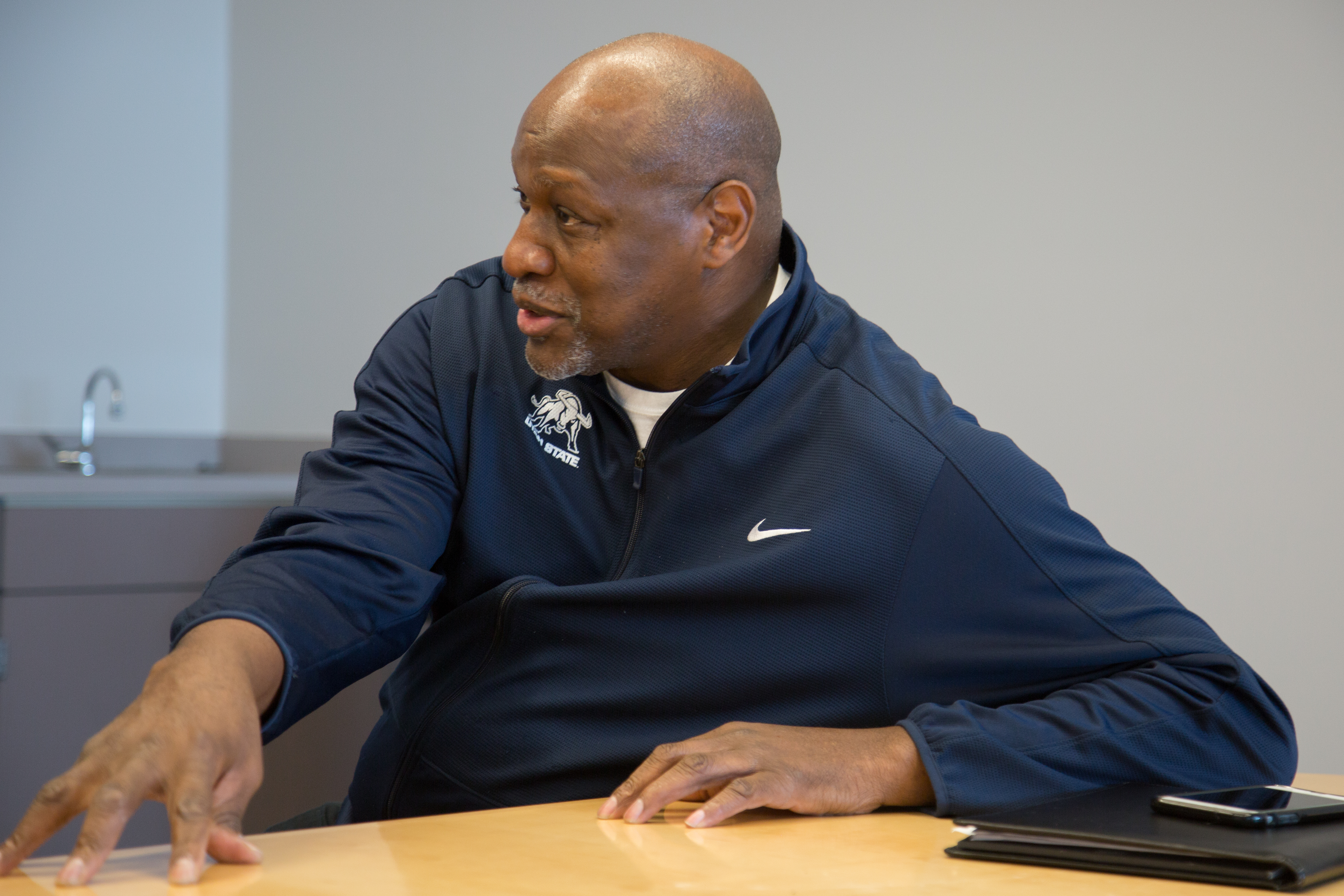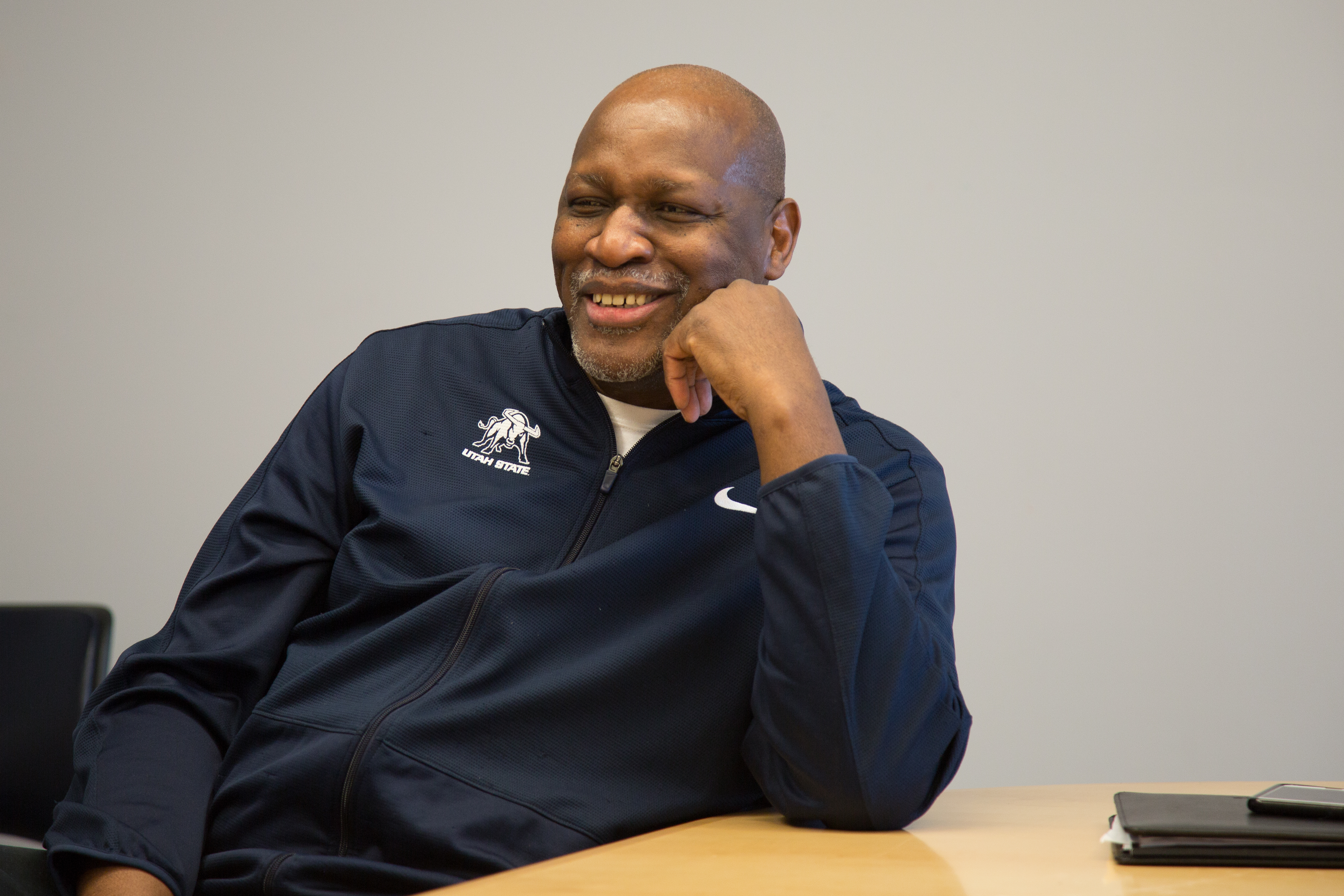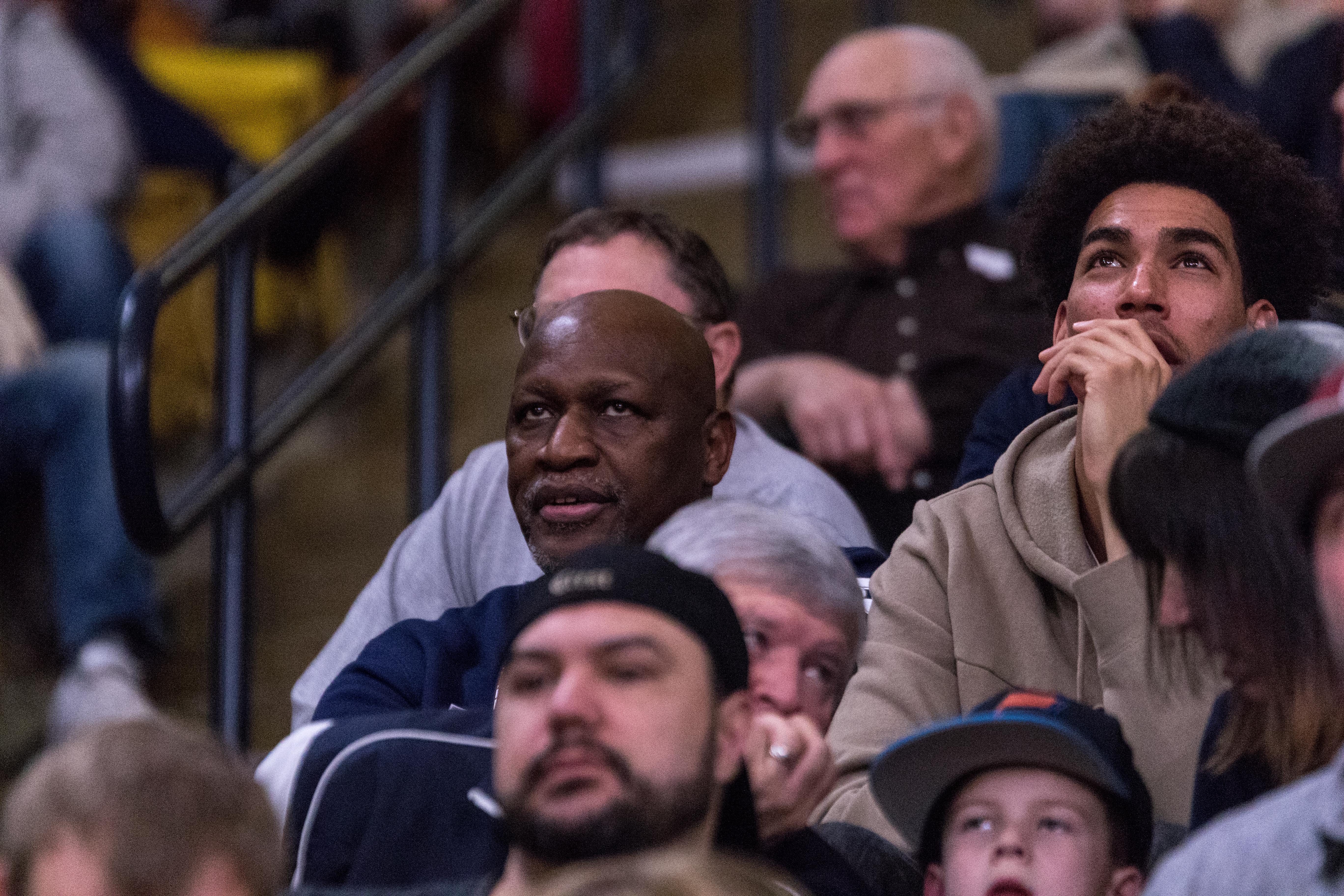More than a game: The legacy of Jimmy Moore
Jimmy Moore and his wife, Debra, attend every game. They sit in Section E of the Dee Glen Smith Spectrum, next to the student section.
He’s not one to yell at the referees or the opposing team, instead providing commentary and critiques on his favorite player on the team this year, the senior with the afro and the crisp “14” on his jersey.
As he watches the game, Jimmy’s voice rises, almost accidentally, like he forgets how loud he can be. “You need to calm down,” Debra gently reminds him. “People around you don’t see the game how you see it.”
She’s right. He has decades of experience with the sport, including three years playing in this same building. His is a knowledge of the game shaped over many years as a player, coach and spectator.
But Jimmy Moore’s passion comes from a deeper place — the sport has made an indelible mark on his life. Basketball provided Jimmy Moore an opportunity for his education, his career and best of all, he says, his family.
“I can’t ever say it’s just a game,” Debra said. “Because it’s not.”
*****
The “Gateway to the Chickasawhay” the town’s website proudly claims, the way all small communities lay hold on any tidbit to sound unique. The referred-to gateway is Leakesville, population 898, and the Chickasawhay is one of the many rivers that flows through southeastern Mississippi.
It’s the kind of place where “Main Street” is the only street and outsiders only find the town if they’re looking.
Dale Brown was looking.
The year was 1970 and Leakesville had something most small towns don’t have — one of the best high school basketball players in the state. Brown, then an assistant coach at Utah State, wanted Jimmy “Shimmy” Moore on his team.
“I kept thinking to myself, ‘I hope people don’t find out about him because they don’t know how good he can be,’” Brown said.
He was long and tall — measuring in at 6-foot-7 while in college — with a 45-inch vertical that earned him the nickname “Jumpin” Jimmy Moore during his days in Aggie blue.
“After I met his family,” Brown said, “I thought, ‘That’s exactly the kind of guy I want to coach.’”
But it was more than the on-court potential that so intrigued the coach.
“There was just a sensitivity, a gentleness, an honesty about him,” Brown said. “I don’t have a ouija board, I’m not a savant but I’ve just been around kids long enough. I knew he was going to be a success.”
Jimmy lived in humble circumstances growing up, sharing a home with his parents and 11 siblings.
“They were so poor,” Debra said. “It’s so sad — they didn’t even have meat.”
On the rare occasion the family was able to afford bacon, Debra said, Jimmy’s mother would give it to their father so he would have the energy to work. The grease would then be put into the gravy or poured onto some biscuits so the children could at least get the flavor of the meat.
“When he told me that it just broke my heart,” Debra said. “He never takes anything for granted.”
Segregation was still prominent in the South at that time — the school system in Leakesville didn’t integrate until 1969, a decade and a half after Brown v. Board of Education.
“You grow up in those things and you see it every day. It’s a part of that culture you live in, and you learn to adjust and deal with it,” Jimmy said. “Then when you go away and you become a different person, you come back and you go, Wow, I can’t believe some of the stuff that I had to endure as a kid.”
“Where I lived, in my community, I could throw a football or a baseball and hit the closest high school to my house, but we couldn’t go to school there because it’s what they call a ‘white school’,” Jimmy remembers. “We had to bus 10 miles away to go to our school. We were walking past the school all the time, but we couldn’t go there.”
 Kael Mahnken
Kael Mahnken At the beginning of his junior year, Jimmy and his teammates were finally allowed to attend Leakesville High School. Not everyone on the team, though, was allowed to join.
“I’ll never forget, man, we had this coach and he was like our father,” Jimmy said. “He was the kind of guy you’d jump out a window for.”
With the students attending different schools, teachers and coaches were shuffled around within the school system to meet the changing needs. Leakesville was the largest school in the area and it seemed only natural that the most successful coach in the system would be sent there. Instead, he was assigned to one of the smallest schools in the county.
“I tell you what, you talk about broken-hearted people,” Jimmy says. “He was never the same. It just took his heart.
“He was never the same.”
The systemic racism showed up on the basketball court as well. During the state tournament one year, Leakesville High squared off against Sumrall High.
“I don’t think they had a black person in that gym or a black person in that community,” Jimmy said.
Every time Jimmy or one of his teammates would score, the other team would start hurling epithets at them.
“It was ‘n—– this and n—– that’ the whole game. ‘N—– where’s your mom at?’ and that kind of stuff,” Jimmy remembers. “I was the captain and I looked at the referee — I’ll never forget this — I said to the referee, ‘Do you hear what this guy’s saying?’ He goes, ‘Oh shut up n—– and just play’.
“That’s what I came from.”
*****
Jimmy’s basketball skills are what attracted the attention of schools around the nation, but it was Brown and the educational opportunities at Utah State that eventually brought Jimmy to Cache Valley.
While Brown would later have a long and successful head coaching career at Louisiana State University, at the time he was recruiting “Shimmy” Moore, the young coach hadn’t yet had much experience with the South.
On one recruiting trip, Brown took Jimmy to one of the local diners for a meal. When they got to the restaurant, Jimmy finally worked up the courage to tell the coach that he couldn’t get food there — they wouldn’t serve him.
‘He goes, ‘Get out of here!’” Jimmy remembers, “‘You’ve got to be s——- me right?’ And I go, ‘No, I’m serious.’ And he goes, ‘That’s bulls—, we’re going in today.’”
The two of them walked into the restaurant, Jimmy nervously following Brown. The cook turned around to welcome the guests, but stopped cold when she saw Jimmy.
She began speaking to Brown. “‘How can I help you? He knows we don’t serve his kind in here,’” Jimmy remembers. “Oh, I’d never felt so small in my life. I was so embarrassed.”
“I went to the window really angry,” Brown said. “I had my body about halfway in the window. And I said, ‘I’m not moving from this window until I get my damn chicken.’”
He was unsuccessful at shutting down the restaurant like he threatened, but the incident still left an impact on the coach.
“I thought, when I left that little town, ‘You know what, he’s done what most people couldn’t do,’” Brown said. “All the horrendous racism that was going on at that time, he chose instead of going down the bitter road, to come down the better road.”
Those experiences endeared the assistant coach to Jimmy, leaving USU as one of the five schools he took official visits to before committing. The visit to Logan sealed the deal.
Each of the other schools, Jimmy said, spent the majority of the visit pitching him on the quality of the basketball program and the success he and the team could have if he played there.
Utah State, on the other hand, took him to meetings with academic advisers and professors, not even showing him the basketball arena until the night before he flew back to Mississippi.
“I was going back,” Jimmy said, “I’m on the plane and I’m thinking, ‘That was one of the most boring trips I’ve had.’ Then it was weird, it was almost like somebody was sitting next to me, and it goes, ‘But what was different about it?’”
By the time he talked to his parents that night, Jimmy’s mind was made up.
*****
While basketball has been a wonderful and important part of his life, it’s the things basketball has provided that truly motivate him, Jimmy said.
The opportunity for an education is something that most people in Leakesville didn’t get at that time. Jimmy went on to earn a bachelor’s degree in physical education and, after a 12-year professional basketball career in the NBA and Europe, a master’s degree in education.
“Utah State really wanted him to come play sports and be educated,” said Jalen Moore, Jimmy’s son, the senior on the basketball team. “I think that’s where he turned the table and was like, ‘I want to go there and be successful in life and be successful after.’”
Jimmy has shared that mindset with both of his sons.
“Something he would always tell me and Jalen is, no matter what, just finish your education,” said Grayson Moore, who graduated from USU last year. “He would always say basketball can only take you so far.”
At the end of his international career, Jimmy took a position as an assistant coach at Utah State. He was later hired to work in the admissions office at the university before moving to the athletic department in 2011.
 Kael Mahnken
Kael Mahnken He’s “Mr. Aggie,” said Jana Doggett, the executive associate athletic director at USU. “Alum, parent of alums, obviously a committed employee — a lot of his life has been about the Aggies.”
Jimmy sees his work now as a way to give back to the place that gave him so much.
“I love my job,” Jimmy said. “I’m sure there’s no one in this athletic department who has more of a passion for Aggies — athletics and the university — than I do.”
In his time in admissions and now working with student-athletes, Jimmy uses his experiences to explain how appreciative he is of the opportunities he was given.
“Utah State has been good to me,” he said. “That’s what motivates me to get up in the morning, to see if I can go make a difference, whether that be in a student-athlete’s life or in a student’s life.”
The only thing in life that rivals his love for the university, Jimmy said, is his love for his family.
*****
Debra met Jimmy in 1990, while he was an assistant coach at Utah State. She was living in Salt Lake City then, working at a lawfirm, and didn’t know about Jimmy’s legendary basketball career with the Aggies. He asked her to dance one night (“He has that deep low voice,” she said, “and I looked up and I’m like “Oh, sure!”) and they were married three months later.
“They’re the same person,” Jalen said. “They love each other.”
Within a few years, the family had doubled in size — first Grayson, then Jalen. The boys, naturally, were taught to love basketball and grew up playing the sport.

Now, more than two decades later, Grayson has graduated and Jalen will soon join him. A long-lasting memory for the family will be the opportunity the two boys had to play on the same team last year.
“That was a main goal of mine and Grayson’s growing up and it was something our dad really wanted to see happen,” Jalen said. “It was awesome to be on the court at the same time as my brother, looking up and seeing our mom and dad.”
Jalen has made his own marks on the Utah State record books in his time at the school, passing his father on the all-time scoring list during the 2015 season.
“I think he was more happy for me to pass him than he was for reaching that in his career, and that means a lot,” Jalen said. “My dad’s helped us so much in our lives and we can’t ever pay him back for that.”
As Jalen puts on the Utah State uniform for the final time next week, it will, in a way, bring Jimmy Moore’s legacy full circle.
But as those who know him best will say, his legacy is so much more than just his accomplishments with the university.
“I hope people realize what an outstanding man he is,” Brown said. “He’s really a good man.
“I would have been very proud to have Jimmy Moore as my son.”
— thomas.sorenson@aggiemail.usu.edu
@tomcat340


I’ve never met Jimmy, but I’ve heard nothing but how much of a gentleman he is. Lucky to have the Moore family as part of the Aggie family. Great story Tommis!
I played basketball with Shimmy at Leakesville High School and I remember those times you mentioned in this article but there was always love on our team This is a great article and describes Shimmy perfectly. You the man Shimmy ….proud of you… David Huff
Great story indeed: Impressive look back and view on the current situation.
The description fits exactly the Jimmy Moore as we know him in his European years: every inch a sportsman, gentleman and family man. And as Dale Brown said: an outstanding good man!
Congratulations Jimmy, Debra, Grayson and Jalen!
Great story. Shimmy (as we called him) is one of the best players to come out of my lil ole home town….Leakesville. Proud of his accomplishments. The Moore family is well known for their basketball skills…a great fqmily.
Ik player with Jimmy in Amsterdam the Netherlands. One of the best players i played with. Also a guy with whom you could talk about different issues. A Champion, teamplayer, mvp etc. Thank you Jimmy for a wonderfull basketbal year
I have known Jimmy for 15 years and this article is right on the money! His love for the students at Utah State, the love of basketball, and most importantly is his love for his family! Jimmy has a heart of gold that’s hard to find these days. He’s genuine, compassionate, loyal, and caring! I have moved away from Logan for three years now and I can honestly say that I truly miss this big teddy bear. Utah State has been lucky to have this man represent the University with such grace, and I’ve been fortunate enough to call this lovable human being my friend. Love ya Jimmy!!!!
I grew up with Shimmy! My brother, Joel, and he were on the basketball team at Leakesville. In their senior year, Joel was the only white player on the 5-man team. We were all good buddies, and racism never stood in the way of our friendship. What a time to remember! Think of you often, Shimmy! God bless you! Al Fike, Comedian and Minster, Richardson, TX (www.alfike.com).